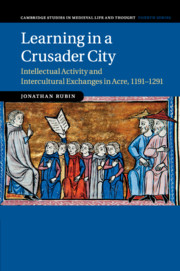'… Learning in a Crusader City offers a refreshing look at thirteenth-century Acre as a crossroads of languages and cultures where intellectuals worked and thrived. Scholars of many different disciplines, including interfaith contact, jurisprudence, and translation, will find much to ponder in this narrow, yet illuminating, case study.'
Scott G. Bruce
Source: The Medieval Review
‘… this is a very strong piece of work and its overall conclusion is both plausible and very well evidenced … Acre’s centrality within the commercial, diplomatic, and crusading networks of the thirteenth century, as well as Rubin’s scrupulous attention to other texts connected to the Franks’ other Levantine cities, give this work a scope and reach that extends far beyond Acre’s ramparts.’
Nicholas Morton
Source: The Journal of Religious History, Literature and Culture
‘… this book makes valuable contributions to the field of intercultural exchanges … Rubin draws attention to the wide range of genres available in French, Latin and Hebrew and the intercultural exchanges that took place in the city, in the process relocating Acre from the periphery of the Latin West to identify the city as a centre of cultural exchange in the Latin East.’
Danielle E. A. Park
Source: The English Historical Review
‘Rubin has successfully put Acre back on the medieval intellectual map, and his work should be of interest not only to historians of the Crusades, but also to anyone interested in the wider topics of learning and intercultural interaction in the Mediterranean World.’
George Summers
Source: Comitatus: A Journal of Medieval and Renaissance Studies
‘This lively and entertainingly formulated volume is thus a stimulating and profitable read for anyone who is researching the history of Syria-Palestine in the period of the Crusades.’
Margit Mersch
Source: Historische Zeitschrift



